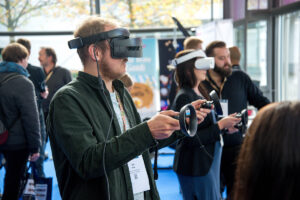The interactive future for theatres

In 2019, experience trumps product. Retail outlets are retooling their spaces to make the experience of shopping, the so-called ‘retail journey’, as attractive to the consumer as the items they hold in their arms as they leave the shop. Many media companies are attempting to emulate Time Out’s food market success and transition into events and experience businesses, the better to appeal to the Millennials and cash-rich Boomers who prioritise making memories.
A lot of that is driven by the rise of consumer technology that enables brand new experiences, from portable 3D printers that let you take away a physical model of your own face at the end, to venues dedicated entirely to esports, to the ever more interactive experiences offered by theme parks. Many savvy media companies and retailers are keeping one eye firmly on the inexorable (if slow) rise of consumer VR, AR and mixed reality (together, ‘XR’) when it comes to creating or providing those experiences to a new and hungry audience.
One particular form of content that has never lost sight of ‘the experience’ has been the theatre, where ‘the ‘experience’ is and has always been its primary selling point. But, far from now being set in opposition to the rise of tech-driven experiences, some theatres are embracing it, using it to enhance their appeal to the new breed of experience-hungry consumers, and building something completely new as a result.
VR is expensive and not – yet- in many households, though it is predicted to continue to grow and most of its proponents are loudly talking about what a priority it remains for them. Neilsen predicts that the install base will grow from 14m units in 2018, to 51m by 2022. But in order to fuel this kind of growth, headsets and OSs are going to have to improve and come down markedly in cost. More importantly, perhaps, OEMs are going to have to find ways to make the kit more widely available for sampling: nobody is going to shell out several hundred pounds for a technology they have not had the opportunity to try.
And it might well be that this this need for users to experience the technology has serendipitous benefits for owners of venues, ever-hungry to attract new visitors. Increasingly, XR is being seen as a great attraction for arcades and theatres, where people are going to try XR as an experience in and of itself. Theatre companies are increasingly using VR and AR platforms in exciting and immersive ways. Galleries and museums are using the technology to enhance their offerings – at last year’s Modigliani exhibition at Tate Modern, the longest queues were reserved for the VR room, where you could ‘experience’ the artist’s studio. At the same time, companies like The Void are opening their own venues for multiplayer immersions which go way beyond the home experience.
In fact, according to some analysts, it isn’t XR that is required to make theatre appeal to Millennials, it might even be the other way round, with some of the most lauded XR experiences being explicitly designed to recreate a theatrical experience. Nonetheless, all these experiences are relatively small-scale – a handful of users at most, or (in many cases) single-user immersive experience. Partly this is a practicality based on costs and availability of kit; and partly it is a function of the interactive nature of many of the experiences.
Nonetheless, it is a limitation – the cost of kitting out an entire auditorium with hundreds of individual headsets would be prohibitive. But as a showcase for the technology, as well as a way for venues to attract new audiences, XR and theatres should be spending more time in one another’s company. Both businesses thrive on providing unforgettable experiences; both work best when its audience can immerse themselves and in a narrative; and, with XR OEMs and producers increasingly realising that a shared experience is an enhanced experience, maybe the theatre is extended reality’s natural home.
Martin Tripp / Chris Sutcliffe
Martin Tripp Associates is a London-based executive search consultancy. While we are best-known for our work across the media, information, technology, communications and entertainment sectors, we have also worked with some of the world’s biggest brands on challenging senior positions. Feel free to contact us to discuss any of the issues raised in this blog.